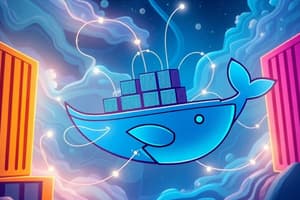Podcast
Questions and Answers
What is the difference between containerization and virtualization?
What is the difference between containerization and virtualization?
Containerization allows multiple applications to run on the same operating system kernel, while virtualization allows multiple operating systems to run on a single physical machine.
You can build and run Docker containers using the ______.
You can build and run Docker containers using the ______.
command line
What is the purpose of a Dockerfile?
What is the purpose of a Dockerfile?
To configure a Docker image.
Which tool is used to manage a multi-container application?
Which tool is used to manage a multi-container application?
What command is used to build a Docker image from a Dockerfile?
What command is used to build a Docker image from a Dockerfile?
What command lists the containers currently available?
What command lists the containers currently available?
The command docker run is used to create a new Docker container.
The command docker run is used to create a new Docker container.
What is the command to remove a container?
What is the command to remove a container?
To check for the environment variable, you type echo $______.
To check for the environment variable, you type echo $______.
Which command is used to view the contents of a file in the terminal?
Which command is used to view the contents of a file in the terminal?
What command allows you to see detailed information about a Docker image?
What command allows you to see detailed information about a Docker image?
Flashcards are hidden until you start studying
Study Notes
Lab Overview
- Lab focuses on creating and running Docker containers and multi-container applications
- Includes three parts: creating a container, configuring a multi-container application, and using Docker Compose for multi-container management
Learning Objectives
- Distinguish between containerization and virtualization
- Build and run Docker containers using command line
- Configure Docker images using a Dockerfile
- Manage Docker networks through command line
- Manage multi-container applications with Docker Compose
Hands-on Demonstration
- Part 1: Creating and running a Docker container
- Create a Docker container named "testc" from image "test"
- Start the container and access it through the shell
- Check for an environment variable and list files within the container
- Stop and remove the container
- Run the container again and output the file contents
- Part 2: Configuring an application with multiple containers
- Check for available images in the registry
- Build and run container images for both an application and database
- Interact with the running containers
- Access application from other containers
- Part 3: Managing a Multi-Container Application with Docker Compose
- Define application services and configurations in a Docker Compose file
- Build and run the multi-container application using Docker Compose
- Test the application by checking container status and accessing services
- Stop and restart services using the
docker-composecommand
Tools and Software
- Docker
- Docker Compose
- Ubuntu Desktop with Terminal
- curl for registry access
Deliverables
- Lab report containing screenshots of the following:
- Successful "test" image build
- Working directory, files, and environment variable in the "testc" container
- The contents of
file_1.txtin the "testc" container - Docker Compose commands and status output
Studying That Suits You
Use AI to generate personalized quizzes and flashcards to suit your learning preferences.





